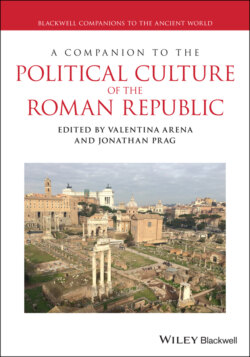Читать книгу A Companion to the Political Culture of the Roman Republic - Группа авторов - Страница 37
3.3 Republican Arguments
ОглавлениеThe English republicans of the interregnum adapted traditions of classical republicanism which have been variously interpreted by scholars: the Roman sources of an early modern republican philosophy of freedom have been particularly emphasised by Quentin Skinner, but even J.G.A. Pocock’s Machiavellian Moment makes room for Roman elements alongside the influence of Aristotle, particularly through the inheritance of Machiavellian thought (Skinner 1998; 1975; and see Chapter 2). We should not exaggerate the importance of classical republican theory in this political context, which ran alongside less demonstratively ‘foreign’ attempts to establish a republican culture (Corns 1995; Kelsey 1997). However, the events of the civil wars, and particularly the regicide, did release some radicals and republicans from the constraints of English political precedent and allowed classical arguments about monarchy, tyranny and republics to emerge fully into public political debate – even if they had long been familiar in literature and in the schoolroom (Worden 1991: 443–449; Peltonen 2013). Republicans were particularly drawn to Rome because of her longevity and imperial success, as well as the familiarity of texts by Livy, Cicero, Sallust and Tacitus which bore witness to the values of the Republic and to the consequences of its rise and fall (see Chapter 9; Chapter 10; Chapter 11).
The histories and oratory of the Roman Republic furnished seventeenth-century writers not just with examples of patriotic fortitude and valour, but with a language which could evoke such Roman virtues even without explicit mention of Rome (on rhetoric, see Chapter 32; on ancient accounts, see Part II). This belief in a distinctively Roman matrix of virtue and valour was widespread enough to be found in texts or speeches which fell well outside the bounds of republican discourse. But for republicans, the cultural pervasiveness of these notions, along with their association with the greatest of the ancient republics, meant that the language of Roman valour and virtue was enormously useful. Against royalists emphasising the virtues of monarchy and of obedience to it, republicans could invoke a different model of virtue, but one with enormous cultural clout. Republicans could thus redescribe behaviour that royalists saw as unruly or rebellious as Roman valour in the cause of liberty. Thus John Milton, on the eve of the restoration of the monarchy, mourned the fact that the English people were apparently about to squander their early republican achievements, which had displayed ‘a spirit in this nation no less noble and well fitted to the liberty of a Comonwealth, then in the ancient Greeks or Romans’ (Milton 1980: 356). In Milton’s works the language of Roman virtue was pushed in a distinctively Ciceronian direction, not erasing its martial character, but emphasising that even the virtue of fortitudo, or courage, was not always martial, and that it was not war itself, but the certamen virtutis gloriosissimum atque pulcherrimum (the trial of virtue most fair and most glorious) and studium libertatis (zeal for liberty) which motivated the Greeks and Romans to expel their tyrants (Milton 1933: 6–7; Dzelzainis 1995). Even where Rome was not mentioned by name, in Milton’s Latin writings the use of the terms found in Ciceronian and other encomia of the Roman Republic and its defenders gave a Roman flavour to his republicanism. At the start of the Second Defence Milton credited the civium virtus eximia, magnitudo animi and constantia of the English (the effulgent virtue of its citizens…their magnanimity and steadfastness) with liberating the res publica (Commonwealth): it is hard to read these Latin phrases without Roman exempla in mind (Milton 1933: 2–3).
